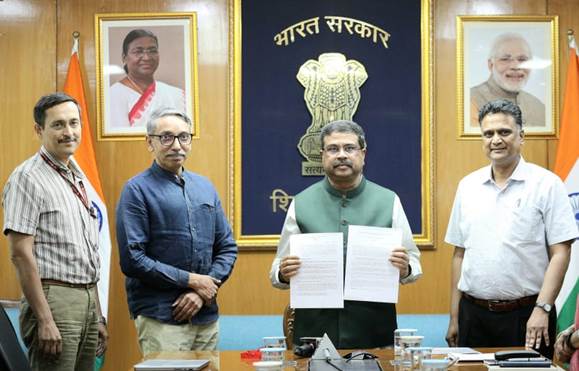Superseding the UGC (Institutions Deemed to be Universities) Regulations 2019, the new Regulations are built on the principle of a “light but tight” regulatory framework envisioned in the National Education Policy 2020. There are around 170 deemed institutions in the country currently and were faced with a kind of uncertainty since 2010 in face of standoff with the regulators and public perception.
Union Minister of Education and Skill Development, Dharmendra Pradhan on June 2 while releasing these Regulations in the presence of Prof. Jagadesh Kumar, Chairman, UGC and Sanjay Murthy, Secretary (Higher Education), Ministry of Education said that these revised regulations will facilitate creation of many more quality-focused deemed to be universities in an objective and transparent manner. “The new simplified guidelines will encourage universities to focus on quality & excellence, strengthen the research ecosystem and have a long-term impact in transforming our higher education landscape,” he added.
- Regulations are aligned with National Education Policy 2020. The objectives of the deemed to be universities, among other things, include providing higher education leading to excellence in different branches of knowledge, primarily at undergraduate, post-graduate, and research degree levels, fully conforming to the concept of a University, to strengthen the research ecosystem and to contribute for social transformation through socially responsive teaching, learning, research, and fieldwork.
- The eligibility criteria to apply for deemed to be university status is NAAC ‘A’ grade with at least a 3.01 CGPA for three consecutive cycles or NBA accreditation for two third of eligible programmes for three consecutive cycles or in the top 50 of any specific category of NIRF for the last three years continuously or in top 100 of overall NIRF Ranking for last three years continuously.
- A cluster of institutions managed by more than one sponsoring body can also apply for deemed to be university status.
- Sponsoring bodies seeking deemed to be university status to their institutions may apply ‘online’. The Expert Committee assesses the facilities, interacts with stakeholders, and verifies the documents, all in virtual mode.
- Institution deemed to be University may start new courses or programmes in any field in their existing campus and approved off-campus centres, with the prior approval of its Executive Council and, also wherever applicable, with the approval of the relevant statutory council.
- An existing institution or an institution starting from the beginning with the focus on teaching and research in unique disciplines and/or addressing the strategic needs of the country or engaged in the preservation of Indian cultural heritage or preservation of the environment or dedicated to Skill Development or dedicated to Sports or languages or any other discipline(s), so determined by the Expert Committee of Commission, will be considered under ‘Distinct Institution’ Such Institutions will be exempted from eligibility criteria.
- Institutions deemed to be Universities with minimum ‘A’ grade and above or ranked from 1 to 100 in the “Universities” category of NIRF rankings of the relevant year are eligible to set up off-campus centres. Institutions declared as deemed to be Universities under a “distinct category” can apply for off-campuses after five years of their declaration if they are accredited with an A grade or figured in the top 100 in the “universities” category of NIRF.
- The Regulations are quality-focused. Deemed to be Universities with NAAC less than an ‘A’ grade or ranked more than 100 in the current NIRF ranking (Universities category) will be monitored on the academic parameters by UGC Expert Committee. Failing to rectify the deficiencies pointed out by UGC Committee, UGC may recommend the withdrawal of permission given to start new courses or new programmes by the institution deemed to be University, in any field, in their existing campus and the approved off-campus centre.
- The institutions deemed to be Universities shall follow the rules and regulations regarding fee structure, number of seats, etc., issued by the relevant statutory bodies, and in case an institution deemed to be University offers different courses which come under the regulatory ambit of different statutory bodies, namely the University Grants Commission, the All India Council of Technical Education, National Medical Council, etc., the rules and regulations regarding fee structure, number of seats, etc., issued by such statutory body concerned shall be applicable.
- The institution deemed to be University may provide fee concession or scholarships or may allocate seats to meritorious students belonging to socially and economically deprived groups of the society.
- The institutions deemed to be Universities shall compulsorily create Academic Bank of Credits (ABC) identities of their students and upload their credit scores in digital lockers and ensure that the credit scores are reflected in ABC portal and adopt Samarth e-Gov. Further, institutions can offer Twinning Programmes, Joint Degree Programmes, and Dual Degree Programmes in accordance with the provisions stipulated in the regulations concerned.
- Transparency in the functioning of the deemed to be university helps build a stronger relationship between students and institutions. The regulatory provisions enable institutions to be more transparent. The institution deemed to be University shall make available the prospectus on its website at least sixty days before the commencement of admissions, including fee structure, refund policy, number of seats in a programme, eligibility qualifications, admission process, etc. Every institution deemed to be University shall maintain the records of the entire process of selection of candidates, exhibit such records on its website, and preserve such records for a minimum period of five years.
Backgrounder:
According to the University Grants Commission Act of 1956, the “deemed-to-be-a-university” status can be granted to any higher education institution other than a university, on the recommendation of the UGC, by the central government. These institutions enjoy more autonomy than regular universities in terms of fee structure, admissions process, curricula designing, and degrees to be awarded. They can be public or private and have enjoyed the status of universities without being established by national or state legislation.
From 1956 to 1999, the status of deemed university was conferred only on 37 institutions—such as, the prestigious Indian Institute of Science in Bangalore, the Indian Agricultural Research Institute in Delhi, the Tata Institute of Social Sciences in Mumbai, and the Birla Institute of Technology and Science in Pilani. However, a new government in 1999 granted this status en bloc to 17 regional engineering colleges and several other private institutions providing professional courses, such as the Manipal Academy. From 1999 to 2009, their number rose from mere 37 to 127. In 1999, a special provision was made to confer the status of de novo universities for institutions showing “potential for excellence” in terms of innovative teaching methods and research, rather than excellence per se.
On January 18, 2010, deemed-university status in the case of 44 private higher education institutions, spread over 13 states was withdrawn by the ministry of education (then MHRD) after complaints of nepotism and higher fees coupled with deficiencies led to court battle and the government felt the private providers were taking undue advantage of the proving and more rational regulations were required. The first set of regulations in this regard was notified in 2010 and these were subsequently revised in 2016 and 2019.
In 2020, UGC restrained 127 educational institutions from using the word ‘University’ in their name. As such the issue has been hanging fire for over a decade and now with NEP 2020 mandate, the issue has found a resolution. UGC chairperson M Jagadesh Kumar said that the 2023 guidelines are in tune with NEP 2020 and they are light but tight. “We hope these regulations will encourage many more high-quality higher education institutions to be established in our country in emerging areas to meet the aspirations of our students. Since ‘deemed to be universities’ wording is part of the UGC Act, 1956, we cannot remove this term at this time. However, it will be removed once the Higher Education Commission of India is established through an act of Parliament,” he said.














